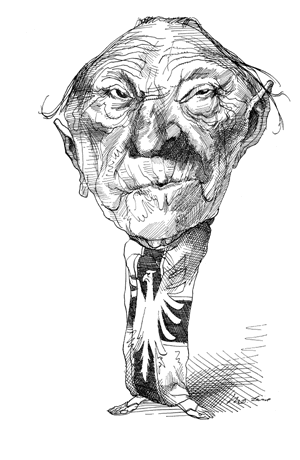Neither of these books is attractive. A historian, weighing them lugubriously in his hand and wondering whether he must buy, could mentally run through a few considerations like these: not much new in them, what’s new probably not reliable, both reek of spleen, both heavy going…. But in the end, perhaps with a groan, he will ask the girl to wrap them up and charge them to his account. They are not sources of information, but they are remarkable illustrations.
Two mistrustful old men, the philosopher and the statesman, have demonstrated once again the two poles of mental extremism which drag askew so many German attempts to assess the first twenty years of West German statehood. Younger men—one thinks particularly of Eschenburg and Dahrendorf—are by comparison immune to these extremes, which are the utmost of self-satisfaction and the utmost of condemnation. Both, of course, add up to the need for self-justification, national and personal, which must afflict any German old enough to have exercised authority in the last forty years.
For Karl Jaspers, the picture presented by the German Federal Republic is black and getting daily blacker. Everything is wrong. The state was founded for the wrong reasons, fell under the leadership of the wrong people who in turn gave jobs to even wronger people, adopted (with a very few exceptions) the wrong attitudes in foreign and German policy, and is now sinking irremediably into dictatorship under the weight of its own wrongness.
Millions of West Germans have read this verdict upon themselves—most of the atrabilious passages were serialized in Der Spiegel—and, as a foreigner living in the country, I would suspect that most of them conspue it. Some do so, no doubt, as deaf and blind nationalists, but many reject it because, simply, they do not recognize the portrait. And a discerning few reject it because they know that it panders to the national leaning to hysterical self-defamation, an emotional debauch as mindless and repulsive as hysterical self-affirmation. One cannot help noticing the masochism of those who are already writhing in public under the stern professor’s lash.
IT IS THE PAINSTAKING damnation of everything, detail by detail, which makes Dr. Jasper’s essay not only unhelpful but ridiculous. Parts of his case are cogent enough, if not very new. Arguing his general points from last year’s grand argument on the timebarring of Nazi murders, and from the major Bundestag debate which ended in the decision to prolong the limit for prosecution, he puts forward two definitions: That crime against “Menschheit,” as opposed to crime against “Menschlichkeit,” is a new offense not to be caught within existing laws and penalties; and that the state which on principle commits the crime against “Menschheit” itself becomes a qualitatively new state, a “Verbrecherstaat,” which can in no sense be considered a valid institution with a claim to loyalty. It follows that the successor to such a state must be a totally new creation, a clean break with the past, based on the inner conversion of the individual and the purging of political guilt. The Federal Republic is not such a new creation.
This is well known, and many of the deputies who spoke in that debate so mercilessly criticized by Dr. Jaspers were aware of it. West Germany and East Germany were and largely remain the creations of the victors. Jaspers mocks the Bundestag speakers for pretending to the world that some German “general will” had not only formed the West German state but driven the government to change its mind and prolong the hunt for Nazi murderers. But what else could they have done? To pass an unpopular act by referring to supposed “changes of public opinion,” when a parliament is aware that the act is both right and resented, does at least offer the citizen a form of polite leadership, a chance to change his mind discreetly.
Jaspers then proceeds to argue that the whole trend of the West German state is towards a party oligarchy that will be followed by dictatorship. All the normal failings of a party system are quoted as if they had never occurred anywhere else. A grand coalition between government and opposition, a new emergency constitution, are about to destroy personal liberty and turn the parties into organs of the state. The Basic Law provisions against proliferation of small parties and unstable governments are to Jaspers mere cornerstones of autocracy. The administration already displays contempt for the press and love of secrecy.
TO ANYONE who knows Bonn, this picture is unrecognizable. Nobody can keep a secret, while the press, I think, is more powerful than anywhere else in the world. Government and civil service, by contrast, are strikingly weak. Dr. Jaspers hero-worships the magazine Der Spiegel and its relentless exposure journalism. Spiegel is certainly a sharp sword for freedom, even too sharp: Its omniscience perforates the self-confidence of the civil service. The officials come to mistrust each other; the public to despise them. This situation is not exactly a democratic triumph.
Advertisement
The trouble is that Jaspers overestimates the strength of West Germany. Rather credulously (as it seems) reading through all the political weeklies in his Swiss study, he misses the feeling of impotence which is sometimes masked by big words. He does reprove Adenauer (whom he admires for his anti-Communism) for helping to “break the backbone of the national character,” but he seems to overlook the preoccupation of Adenauer’s post-war career with West German status. Adenauer was just as conscious as the philosopher that the Federal Republic was not the authentic expression of some German moral revolution, and he therefore went to work to turn this Allied satellite territory into an independent state. The volonté is normally supposed to precede the state: Adenauer could only make the state and then hope some volonté would flow into it. In the same paradoxical way, he had to persuade the Allied High Commissioners that West Germany would only be a reliable partner if she became a free partner.
Adenauer has not minded becoming a national joke in his importunate campaign to sell his memoirs. Everyone bought this first, fat volume. But then there was an embarrassed pause. Reviews muttered uncertainly. Nobody wanted to insult the old man, but from all quarters the opinions trickled together into one: that his account of affairs from the end of the war to the coming of Eisenhower and Dulles was unfair to everybody. The British, who famously threw him out of the Cologne Town Hall for incompetence, are represented as a primitive lot, cold-hearted and addicted to encouraging moral crimes like public ownership. The Social Democrats are penned with vitriol. Huge issues like the resurgence of rabid nationalist movements in the Fifties, or the whole question of the claim to the lands beyond the Oder, are barely mentioned. In this, Adenauer is not even fair to himself.
INSTEAD, HE CONCENTRATES to exclusion upon the problem of occupation status, his tireless struggle to extract one degree of sovereignty after another from the Allied custodians. Long, dull accounts of conversations with François-Poncet or McCloy fill the pages. A flare of malice comes as a relief. And yet Adenauer is contriving to transmit some sort of portrait of himself even through his principles of selection. Reconciliation on the Rhine is what matters; to the east, across disputed rivers, lie hordes of Reds and Protestants who can be conveniently left out of calculations. He professes belief in the “christliche Abendland,” because Western Christianity denies the supremacy of the state. (His own supremacy, after all, was very individual: The political machinery itself could not ensure any kind of power-inheritance for Erhard.) The Christian Democratic Union was to be a new party of spiritual values, since in Adenauer’s view it was socialist materialism which had made Hitler’s victory possible. “National Socialism was simply the last logical development—pushed to criminal lengths—of that worship of power and that seorn for the individual which naturally arise from a materialist ideology…National Socialism found the strongest mental and moral opposition in those parts of Germany which…had been least affected by socialism and the doctrine of Karl Marx.”
This is not original thought. It is a complex of prejudices which any Rhine-land bourgeois might expect to inherit. Some of its assumptions and terms would be acceptable to Jaspers, who is himself very much the old German conservative. But Jaspers is a Faustian. Everything imperfect is intolerable. He allows himself to describe his ideal German, a plaster Kennedy, an angel, a prig. Adenauer detests that sort of thing, which he regards as the ruin of Germany. Jaspers accuses him of “unintentionally contributing to the moral-political corruption of the German people.” Others might say that Adenauer debunked every German dream he could find. He ruled by debunking, an unkind technique. It may be that this is what his opponents cannot forgive.
This Issue
July 7, 1966




